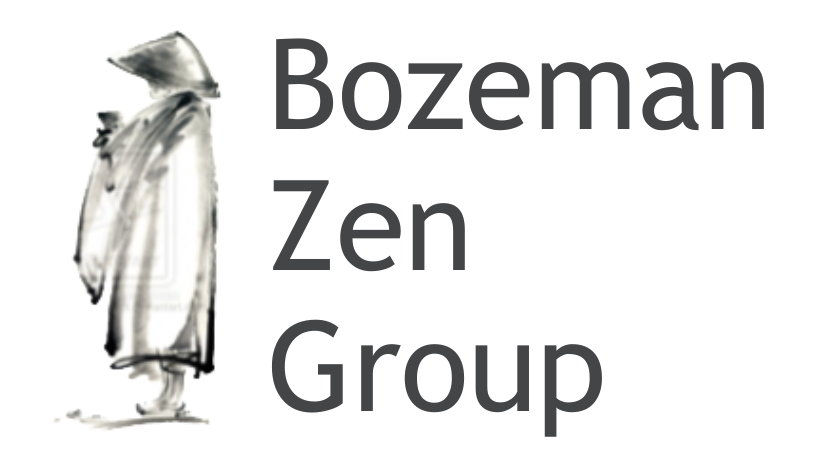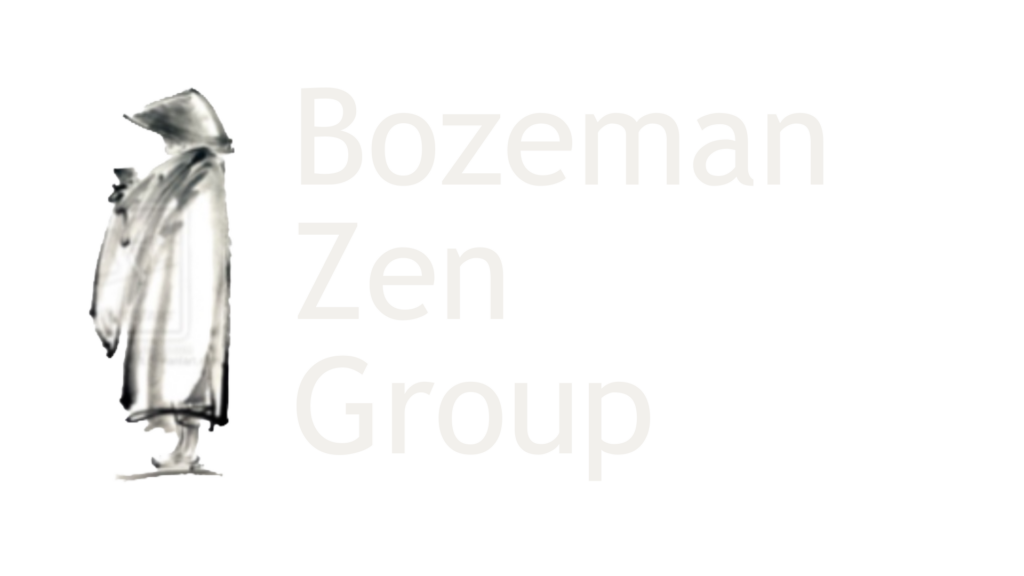What To Expect
We are located as a resident sangha of the Bozeman Dharma Center. There is plenty of parking and an elevator is available! Get directions & contact info.
If you’re attending for the first time
Please contact us at bznzen@gmail.com. We will be happy to provide orientation and zazen instruction at a mutually convenient time. In addition, to become acquainted with the Dharma Center, the first Tuesday of the month at 5:00 pm, we offer newcomer orientation and instruction for the Dharma Center.
When visiting via Zoom for Sunday morning study and M-F sitting, please follow Zoom etiquette:
-
- Please mute yourself upon entering the Zoom room
- We like to have your video on, if that works for you
- However, do turn video off if you need to attend to household matters – moving locations, drinking water/tea during meditation, talking to others
Upon arrival at the Bozeman Dharma Center
- We ask that you remove your shoes upon entry and silence your cell phones and electronic wearables. You may store your personal belongings in the foyer or library. There are extra hooks in the meditation hall.
- Face masks are available on the landing outside the BDC door if needed, as well as hand sanitizer. Covid precautions are currently up to individual preference.
- Please sign in on the credenza attendance sheet.
We begin promptly at the scheduled time
We recommend you come in early to get situated and ask any questions you may have, but if you arrive late, simply enter quietly, find an empty cushion and sit!
What if I have to use the restroom during zazen?
We would prefer you wait until the end of the sitting period, to bow out and quietly go. But if you have to go, you have to go. The proper form is to quietly bow, rise from your zafu/bench/chair, and make your way to the restroom. The restrooms are located on the southside of the elevator.
What if I can’t sit on a zafu because of physical restrictions?
At BZG we welcome everyone and have a few accommodations available. We have several benches and chairs available to use if a zafu doesn’t work for you. You are also free to bring your own, if you prefer, and we have wheelchair accessibility into the zendo if that’s something you need. Feel free to reach out if you need special accommodations so we can have someone ready to assist if necessary.
Terms You May Hear
Bodhisattva – one who lives for the benefit of all beings. This is used either to represent a human committed to attaining enlightenment for the sake of others, or mythical beings such as Avalokiteshvara (bodhisattva of compassion) or Manjushri (bodhisattva of wisdom), who represent particular Buddhist ideals.
Dharma – the teachings of the Buddha or Buddhism, the forms of the world, as well as generally used to define the way the universe operates.
Doan – the person who rings the bells for service and meditation. They also light the candle and prepare chip incense for services.
Dokusan – a formal practice discussion with the teacher. Dokusan is usually offered during sesshin. You can also schedule one outside of a sesshin if you make an appointment with the teacher.

Gassho – the hand gesture of holding the palms together. Gassho is held with the elbows out, the mudra held a few inches from the face, no higher than the tip of your nose.
Jukai – the ceremony for receiving the precepts.
Kinhin – walking meditation. Kinhin is often practiced between periods of sitting meditation. Practitioners walk with hands in shashu in a set pattern around the zendo.
Koan – a Zen story that highlights particular aspects of practice and directs one to examine their own practice.
Kokyo – the person who leads chants during service.
Mahayana – Mahāyāna is a term for a broad group of Buddhist traditions, texts, philosophies, and practices. Mahāyāna Buddhism developed in ancient India and is considered one of the three main existing branches of Buddhism, the other being Theravāda and Vajrayāna. Our Soto lineage is a Mahayana school.
Mokugyo – the wooden drum used for some chants, performed by the Fukudo.
Mudra – a hand gesture such as gassho or shashu.
Oryoki – formal silent meal practice. At SAZC, performed during meditation retreats.
Rakusu – the small square cloth worn around the neck by people who have received the precepts. Recipients sew the robe under the direction of a sewing teacher. The colors of these vary by sect, Center, and lineage. At BZG, blue rakusus are worn by lay practitioners who have received the precepts in a Jukai ceremony.
Rohatsu – the date commemorating the Buddha’s enlightenment, traditionally on the 8th of December. It is often the last day of a Rohatsu sesshin, a seven-day intensive retreat.
Roshi – a term of honor accorded to well-respected long-time practitioners who have received dharma transmission. This honorific follows the honored person’s name (Suzuki Roshi, Sojun Roshi)
Sangha – one of the triple treasures; the Zen community.
Seiza – a form of sitting that occurs while one is kneeling on the floor, resting on one’s heels or a bench. SAZC has seiza benches available for those unable to sit in zafus.
Sensei – a recognized teacher of Zen. This honorific is used after the teacher’s name, much like Roshi.
Sesshin – a silent Zen retreat.
Shashu – the gesture for folding the hands when walking around the temple. The left hand is held against the solar plexus in a loose fist. The right hand is wrapped around the top of the fist with the thumb resting on top of the first hand.
Soji – a brief period of mindful work, usually centered on temple cleaning, including caring for the temple grounds.
Sutra – Buddhist scriptures. Sōtō Zen service involves chanting some Buddhist scriptures from chant books or from memory.
Zabuton – the rectangular padding on which practitioners sit on meditation. The zafu is placed on the zabuton.
Zafu – the round cushion on which practitioners sit in meditation.
Zazen – meditation
Zendo – the meditation hall

